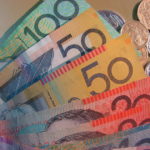Gold held near yesterday’s 12-week low as tensions in Ukraine provided a firm floor. Silver found some momentum, adding to shy gains last session. Copper fell on Wednesday, as a bearish report on China indicated a decline in demand in the world’s foremost consumer of the industrial metal.
Gold futures for June delivery advanced 0.25% to trade at $1284.3 per troy ounce at 14:08 GMT on the COMEX division of the New York Mercantile Exchange. Daily high and low stood at $1289.1 and $1282.1 per ounce, respectively. Yesterday prices dropped to $1275.8 – the lowest since February, testing the support, but despite its rebound the yellow metal has recorded a total loss of 1.73% for the last three sessions.
Silver May contracts also gained today, to trade at $19.445 per troy ounce at 14:05 GMT, up 0.43% from last close. High and low were at $19.545 and $19.380 per ounce, respectively, adding on last session’s insignificant 0.05% gain, while the 3 previous days account for a 1.39% drop.
The crisis in Ukraine remains the strongest support for gold prices, as yesterday Ukraine’s interim president reported two men – one of which was from his political party, were found dead with signs of brutal torture. He also urged for the resumption of the military crackdown on pro-Russian separatists in the East. Meanwhile the US threatened Russia with more sanctions, after the evident failure of the peace measures, agreed-upon in Geneva last week, boosting bullish sentiment.
“Prices are finding some haven support as investors keep a close watch on the Ukraine-Russia conflict,” said for Bloomberg Mark To, head of research at Wing Fung Financial Group.
Adding to bearish sentiment, the US is reporting very solid data as of recently, indicating a strong economic recovery and boosting the dollar, which in turn lessens the appeal of gold as an alternative investment.
Last week saw major indicators for measuring the US economy score significant improvements, as retail sales, consumer inflation and industrial output posted better than expected. Big gains for the American currency, however, were capped by Fed Chairwoman Janet Yellen’s announcement of continuing support for the US economy. ”Persistently low inflation poses a more immediate threat to the U.S. economy than rising prices,” she said, aligning Fed’s policy with inflation and employment rates targets, and signifying that interest rates will stay near zero for some time to come.
Elsewhere, Shanghai volumes for spot gold climbed yesterday to near a five-week high, though analysts say physical demand should have been higher: “The market is bearish right now because there are no physical buyers even at the sub-$1,300 level. Selling by exchange-traded funds is also a negative,” said for Reuters Standard Bank branch manager for Tokyo Yuichi Ikemizu.
Analysts attribute the lower demand in China – the world’s foremost gold consumer, to the weaker Yuan, as it increases the cost of the dollar-denominated metal. The Chinese currency was at the lowest level against the dollar in 14 months on Tuesday. Also spanning negative sentiment, a report last week indicated as much as 1000 tons of gold may be tied-up in financial deals, rather than to meet demand.
Meanwhile, assets in the SPDR Gold Trust remained at their lowest-since-January levels at 792.14 tons, indicating sluggish demand for the yellow metal, in line with the recent down-trend.
Copper futures outlook
Copper continues to lose ground, and traded at $3.0445 per pound at 14:07 GMT on the New York Mercantile Exchanges Comex divison. The may contract ranged between $3.0640 and $3.0280 per pound. The previous four sessions registered a 2.19% rise.
Chinese demand dominated copper markets, as according to the preliminary HSBC/Markit report released earlier today, manufacturing PMI for April stood at 48.3 – a fourth consecutive month of regression, falling short of an expected 48.4, and still below the ” 50” contraction/expansion division figure. Also, the Manufacturing Output Index remained below the 50 mark, to register a 48.0 reading for April, cementing the negative outlook.
Hongbin Qu, Chief Economist, China & Co Head of Asian Economic Research at HSBC, commented on the report: “The HSBC Flash China Manufacturing PMI stabilized at 48.3 in April, up from 48.0 in March. Domestic demand showed mild improvement and deflationary pressures eased, but downside risks to growth are still evident as both new export orders and employment contracted”.
A change of pace might be on the horizon, though, as Reuters reported that, according to several anonymous sources, the Chinese State Reserves Bureau had begun stockpiling bonded copper, amounting to hundreds of thousands of tons. One source put the figure at 200,000, another at 350,000. Whether the SRB has kept a price-triggered plan, or if there is such an operation, is unknown, as officials refuse to comment, though a source hinted a 2-million-ton target for the end of 2015.
A massive surge in demand will help counter recent bearish reports for copper, and traders in Shanghai are reporting that “premiums for bonded stocks are up more than 20 percent to about $110-$130 per tonne this week, from about $70-$90 in end-March,” Reuters reported.
Elsewhere, preliminary US manufacturing PMI figure for April recorded lower-than-expected growth and stands at 55.4, well-short of the 56 forecast. Further negative sentiment was evident, as the numbers for New Homes Sales in the US for March registered a 14.5% monthly drop and fell to an annualized 384 000.
Negative outlook in the world’s largest economy lowers demand expectations for the industrial metal, but they also devalue the dollar, which in turn decreases the cost of dollar-denominated materials, such as copper, increasing their appeal.





